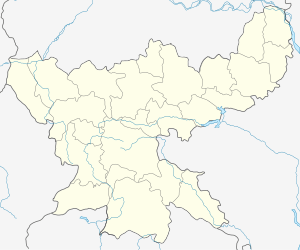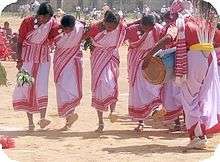Gumla
Gumla is a city which is the headquarters of Gumla district in the state of Jharkhand, India.
Gumla | |
|---|---|
Town | |
 Gumla Location in Jharkhand, India  Gumla Gumla (India) | |
| Coordinates: 23°N 84.50°E | |
| Country | |
| State | Jharkhand |
| District | Gumla |
| Elevation | 652 m (2,139 ft) |
| Population (2011) | |
| • Total | 51,265 |
| • Density | 197/km2 (510/sq mi) |
| Languages | |
| • Official | Hindi |
| • regional | Nagpuri,Kurukh,munda |
| Time zone | UTC+5:30 (IST) |
| PIN | 835207 |
| Telephone code | 06524 |
| Vehicle registration | JH-07 |
| Website | www |
History
Gumla began as a hamlet. A week-long "Cow Fair" (Gau-Mela) took place every year, where items in daily use (utensils, ornaments, grain and sometimes cattle) were sold or bartered. Since these items were only available at the fair, people would keep lists during the year of what they needed. The hamlet's population grew, and it became a village named "Gumla" (a derivative of Gau–Mela).
During British rule in India Gumla was in Lohardaga district, and in 1800 there was a revolt against the Raj. In 1807, the Oraons of Barway (west of Gumla) murdered their landlord from Srinagar, and the uprising spread throughout Gumla. In 1843, Gumla became part of Bishunpur province. The province, which was abolished in 1899, was later named Ranchi; in 1902, Gumla became a subdivision of Ranchi district.
During the medieval era, the Chhotanagpur region was ruled by the kings of the Naga dynasty and Baraik Devenandan Singh ruled the Gumla region. During the Kolh Reble in 1931–32, Vaktar Say reportedly played a prominent role. Ganga Maharaj, who built the Kali Temple at Sri Ramnagar, was active in the Quit India Movement in 1942; for his contribution to Indian independence, he received a pension from the government.
On 18 May 1983 Gumla District was established by Bihar Chief Minister Jagannath Mishra. Dwarika Nath Sinha was appointed the first deputy commissioner of the new district.
Geography
Gumla is in the southern part of the Chota Nagpur Plateau, which forms the eastern edge of the Deccan Plateau. Three rivers flow through the area: the South Koyel, the North Koyel and the Shankh.
Climate
Gumla has a temperate, sub-tropical climate, with an average high of 40 °C (104 °F) in summer and an average low of 3 °C (37 °F) in winter. Average annual rainfall is about 1,450 millimetres (57 inches).
Demographics
As of 2001,[1] Gumla had a population of 51264, with males constituting 52 percent and females 48 percent. Gumla had an average literacy rate of 75 percent, higher than the national average of 59.5 percent: male literacy was 80 percent, and female literacy 70 percent. Fifteen percent of the population was under six years of age. Major languages spoken in the region are Nagpuri (or Sadri), Hindi,and Kurukh.
Connectivity
a) Roadways
Gumla is connected to Ranchi and Simdega via NH – 43. It is connected via State Highways to Lohardaga, Latehar, Daltonganj and other major towns of the State.
It is connected to the State of Chhattisgarh via NH-78.
Union Minister of Road Transport, Highways and Shipping, Nitin Gadkari will soon lay the foundation of the much awaited Gumla bypass project. A total 12.6-kilometre-long (7.8 mi) road shall connect Silam village on NH-78 under Raidih block to Dhodhra village in Gumla block on NH - 23. The work is expected to start by 2018.
b) Railways
Pokla railway station is the only Indian Railways station in the District of Gumla, the other stations in proximity being Bano, Govindpur Road, Tori, Latehar, Orga and Mccluskieganj.
Education
In 1986, Rakesh Popli and his wife, Rama (an expert in childhood education), founded the first Ekal Vidyalaya (one-teacher) schools to bring education to the tribes of the region.[2] From 2018, Deptt. of Higher and Technical Education, Govt. of Jharkhand is going to start Polytechnic College "Gumla Polytechnic".The Polytechnic college will be run and manage under "PPP" Mode by Gumla Educational Foundation.
Three colleges under Ranchi University:
- Kartik Oraon College
- Karunavati Devi Memorial College
- Women's College
Technical Institute
- Gumla Polytechnic
- IIST Computer Institute
- Media INFOTECH
- Wings IT
Schools in Gumla:
- Adarsh Vidya Mandir School, Pugu
- Chanchal Cygnus School, Dumerdih
- D.A.V. Public School, Neemtoli
- Don Bosco School, Bhamni
- Kendriya Vidyalaya Gumla
- Notre Dame School
- Oxford Public School
- S.S. High School
- Saraswati Shishu-Vidya Mandir
- Solitaire Educational Academy
- St. Ignatius School
- St. Patrick School
- St. Stephen's School
- Ursuline Convent School
- Wescott Public School
- Jawahar Navodaya Vidyalaya, Masaria Dam
St. Ignatius School, founded in 1935 and administered by the Jesuits, has produced international-level hockey players.
Tourist attractions
- Palkot Fort- Palkot Fort is a historic place which was one of the capital of the Nagvanshi dynasty. It is located in Palkot block of the district.[3]
- Anjan - Small village about 18 km away from Gumla. The name of the village has been derived from the name of goddess Anjani, mother of Hanuman. Many objects of archeological importance obtained from this place has been placed at Patna Museum. It is believed to be the birthplace of Lord Hanuman.
- Hapamuni - The ancient village Mahamaya temple that is the identity of this village. Hapamuni Mahamaya temple traces its origin to 11th century. It also has some ancient rock sculpture in front of temple dating to that period. Moreover,with the arrival of Hapamuni agro tech,village economy has reached to new dimensions.[4][5]
- Nagfeni - It is known for the Jagannath temple and there is a big rock in the shape of snake 'Nag'.
- Navratangarh- It was the seat of old Nagvanshi kings located in Sisai block of the district.[6]
- Tanginath - Tanginath Dham is located in Gumla's Dumri block. Several devotees during the month of Shravan come to shrine which goes back to 7th or 9th Century AD.[7][8][9]
Festivals and dances

The Karma festival rotates from village to village. It is divided into three parts: Raj karma, Budhui karma and Padda karma. Raj karma is celebrated by the entire community; Budhi karma is celebrated by old women in June to summon the rain god. Padda karma is celebrated by the entire village.
Sarhul, an Oraon festival, is known for its dance. Dancers form a circle, with musicians playing traditional instruments inside it. Men wear a white dhoti with a red border and women wear a white sari with a red border. In the bheja dance, dozens of young boys and girls form a chain by clasping hands. The dance has a variety of postures, with melodious traditional music and rhythmic songs.
See also
- Gumla District
References
- "Census of India 2001: Data from the 2001 Census, including cities, villages and towns (Provisional)". Census Commission of India. Archived from the original on 16 June 2004. Retrieved 1 November 2008.
- "Dr. Rakesh Popli, Nuclear Scientist & one of Ekal's Visionaries, passed away on September 15, 2007". Newsletter October 2007. Ekal Vidyalaya Foundation. Archived from the original on 14 July 2014. Retrieved 22 March 2012.
- "Palkot fort among five heritage sites identified". The Times of India. Retrieved 3 September 2019.
- "1100 साल पुराने इतिहास को समेटे बैठा है हापामुनी का 'महामाया मंदिर', कोल विद्रोह का रहा है गवाह". prabhatkhabar. Retrieved 3 September 2019.
- "Palokot". The Official Website of Gumla. Archived from the original on 16 April 2009. Retrieved 15 September 2015.
- "IN PICS : गुमला में नागफेनी की अद्भुत प्राकृतिक छटा का लें मजा". prabhatkhabar. Retrieved 3 September 2019.
- "Tanginath". The Official Website of Gumla. Archived from the original on 16 April 2009. Retrieved 15 September 2015.
- "Tanginath Dham developing into tourist attraction". The Pioneer. India. Retrieved 3 September 2019.
- "गुमला : प्राचीन धरोहर टांगीनाथ धाम की कलाकृतियां व नक्कासी बयां करती हैं देवकाल की कहानी". prabhatkhabar. Retrieved 3 September 2019.